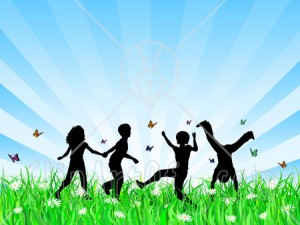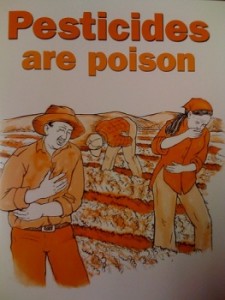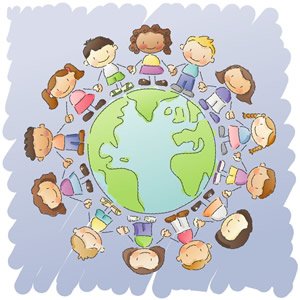‘I Want to Be a Farmer’
Food Justice, Out of the Mouths of Babes
by Randall Amster
“Out of the mouth of babes and sucklings hast thou ordained strength because of thine enemies, that thou mightest still the enemy and the avenger.†— Psalm 8:2
 My oldest son recently “graduated†from preschool. In the endearing ceremony, each of the children was asked what they want to be when they grow up. His precocious, divergent, and unanticipated response was, “I want to be a farmer like my dad.†And I couldn’t have been more proud.
My oldest son recently “graduated†from preschool. In the endearing ceremony, each of the children was asked what they want to be when they grow up. His precocious, divergent, and unanticipated response was, “I want to be a farmer like my dad.†And I couldn’t have been more proud.
To be sure, I’m hardly a “farmer†in any real sense of the word. Yes, I do work hard to scratch out a good-sized family garden each year in this high-desert habitat, and in our five years here we’ve planted an orchard and built a large chicken coop, among other interventions. So while I definitely get my hands dirty and spend a fair bit of time building soil and coaxing vegetables from the granite and clay, my skills are much closer to the hobby side of the coin than anything that can rightly be termed “farming.â€
All of which makes my son’s statement even more powerful to me. He knows that I’m a teacher and that I write a lot, and surely I spend much more of my working time at home on these pursuits than I do on farming. But such cerebral matters are largely invisible to a small child, taking place silently within the confines of a personal computer. Our garden, orchard, and farm animals, by contrast, exist in a tangible and collective manner that registers on a deeper level in the eyes of a child.
In many ways, this is exactly why I do it. Sure, the notions of finding food in the desert, relearning essential skills, becoming more self-sufficient, and staying close to nature are all important drivers as well. Yet the essence of these pursuits really does devolve upon the lessons being taught to the kids. In a society that tries to breed out any connection to the natural world and mostly teaches children that food comes from the supermarket, my son’s impromptu career aspirations are nothing short of miraculous — all the more so, considering that my partner and I were both raised as urban people with little connection to the land.
In addition to our family farming adventures, we’ve also tried to cultivate an appreciation of how nature works and why it’s important. The children have learned to identify wild edible and medicinal plants in our bioregion, helping to harvest prickly pear and banana yucca fruit each season, as well as to appreciate the healing benefits of juniper berries, snakeweed, mallow, horehound, and more. When we go hiking, we like to follow the path of the arroyos and learn where the water flows — leading to a working appreciation of the fact that similar networks exist underground in order to supply most of our water.
The farm animals that we share the space with hold a special place in the children’s minds, constituting an endless source of fascination and yielding regular insights into the origins of our own behaviors. Myriad stories are told (and sometimes embellished) about Daisy the Pig, Samson the Goat, Fred the Rooster, or Rebel the Horse, and it’s vitally important to run through all of the animals’ names from time to time as an exercise in both memory and establishing the full family circle. Likewise, the wild animal visitors we regularly see here occupy an almost folkloric stature in our lives, with tales of hawks and mountain lions and coyotes being central to the experience of being on the land in this time and place.
At the end of the day, much of this family practice comes back to the simple question of where our food comes from. If we had to be fully self-sufficient due to a precipitous collapse of modern conveniences, it would be enormously challenging to say the least. But if we’re able to steadily expand our capacities and knowledge base, we might begin to approach a point of subsistence in time. That may not sound all that romantic of an aspiration, to merely be subsistent, yet on some level it’s among life’s most elusive and worthy aims. Connecting our children to this realization is, in my view, part of our duty as parents, community members, and citizens of the world.
 Stepping back one more level, it’s further apparent just how high the collective stakes really are by now. As Evaggelos Vallianatos recently wrote in Truthout, “the EPA has been licensing toxic and cancer-causing farm chemicals that, essentially, poison our food and drinking water while causing harm and death to wildlife…. And many of these pesticides injure or kill wildlife at extremely low amounts, contributing to a massive extinction of species, which is unprecedented in history.†In addition to the wanton use of pesticides and biocides in food production, we have to grapple with the potentially-disastrous effects of untested genetic modification, unregulated additives, and unchecked centralization of our essential food supplies. As Vallianatos concludes, the food that most Americans eat is “unhealthy and hazardous†because it is widely “contaminated by legal and illegal poison residues†throughout the chain.
Stepping back one more level, it’s further apparent just how high the collective stakes really are by now. As Evaggelos Vallianatos recently wrote in Truthout, “the EPA has been licensing toxic and cancer-causing farm chemicals that, essentially, poison our food and drinking water while causing harm and death to wildlife…. And many of these pesticides injure or kill wildlife at extremely low amounts, contributing to a massive extinction of species, which is unprecedented in history.†In addition to the wanton use of pesticides and biocides in food production, we have to grapple with the potentially-disastrous effects of untested genetic modification, unregulated additives, and unchecked centralization of our essential food supplies. As Vallianatos concludes, the food that most Americans eat is “unhealthy and hazardous†because it is widely “contaminated by legal and illegal poison residues†throughout the chain.
Some years ago, I gave a joint presentation called “What’s on Your Plate?†at an activist conference. It was intended to point out how deeply dissociative we tend to be about our food, to such an extent that even committed social and environmental advocates oftentimes don’t connect the dots of their activism back to the meals that sustain them. This is understandable on some levels, akin to telling coal miners to “breathe carefully†in its long-term futility and thus, in its potential for rationalization. It’s also the case that we’re not presented with many other viable options beyond “willful ignorance†and “hope for the best†when it comes to our general food choices in this culture. Still, in the ensuing years since giving the ill-received presentation, a wider consciousness about food issues has indeed slowly begun to take hold.
And naturally, some circles have come to define this emerging sensibility as a pathology. There’s even a term being bandied about to encapsulate it: “orthorexia,†which is defined as an obsession with “healthy or righteous eating.†According to the website Eating Disorders, the phrase was first coined in 1997 by Steven Bratman, MD, and refers to “people who create severely limited diets in the name of healthy eating…. One of the main challenges with treating orthorexia is that many orthorexics don’t think they need any help. They’re very proud of their dietary choices, and don’t think it’s necessary for them to learn how to eat ‘normally’ since they consider ‘normal’ food to be harmful.â€
Another site, this one a Yahoo! Health column that’s received over forty thousand recommendations on Facebook, further notes that orthorexia sufferers “increasingly restrict their diets to foods they consider pure, natural and healthful…. Those affected may start by eliminating processed foods, anything with artificial colorings or flavorings as well as foods that have come into contact with pesticides. Beyond that, orthorexics may also shun caffeine, alcohol, sugar, salt, wheat and dairy foods.†In addition to such mainstream sources, the Journal of the American Medical Association (JAMA) ran a review of Bratman’s book Health Food Junkies, in which he emphasized the typical orthorexic’s “self righteousness†in denigrating fashion: “As orthorexia progresses, a day filled with wheatgrass juice, tofu, and quinoa biscuits may come to feel as holy as one spent serving the destitute and homeless.â€
Further, a 2004 article in Psychology Today observed that “sufferers devote excessive attention to their own strict rules and often spend hours each day worrying about tomorrow’s meals. Such a person may find himself socially isolated because he doesn’t indulge in everyday dishes.†As the Yahoo! “expert†confirms, “going to extremes in an effort to eat only healthy foods can also be socially isolating and can undermine personal relationships.†If we juxtapose this perspective — namely that one can be too strongly dedicated to healthy foods, resulting in obsession and ostracism — with the “pervasive poison†litany delivered by Vallianatos and others, it highlights the double-whammy of food toxicity and pathologized awareness, paving a sure-fire path to continued complacency when it comes to the food in our midst.
 So when my son publicly proclaims that he wants to be a farmer, the subversive nature of the remark isn’t lost on me. He may well turn out to be something entirely different in his life, but the fact that he’s even thinking about where his food comes from at all is a good sign — and orthorexia be damned. Ultimately, if we’re going to turn that long-overdue corner toward a sustainable and just society, there will need to be a lot of young people with the awareness and skills to manifest life’s essentials of food, water, and energy in a healthy way. The pathology isn’t in knowing too much and trying to take action; it’s in consciously avoiding the knowledge and lapsing into socially-affirmed complicity.
So when my son publicly proclaims that he wants to be a farmer, the subversive nature of the remark isn’t lost on me. He may well turn out to be something entirely different in his life, but the fact that he’s even thinking about where his food comes from at all is a good sign — and orthorexia be damned. Ultimately, if we’re going to turn that long-overdue corner toward a sustainable and just society, there will need to be a lot of young people with the awareness and skills to manifest life’s essentials of food, water, and energy in a healthy way. The pathology isn’t in knowing too much and trying to take action; it’s in consciously avoiding the knowledge and lapsing into socially-affirmed complicity.
There’s no future in that. But for a brief moment last week, I could discern one in my son’s telling words.
Randall Amster, J.D., Ph.D., is the Graduate Chair of Humanities at Prescott College. He serves as Executive Director of the Peace & Justice Studies Association and as Contributing Editor for New Clear Vision. Among his recent books are Lost in Space: The Criminalization, Globalization, and Urban Ecology of Homelessness (LFB Scholarly, 2008), and the co-edited volume Building Cultures of Peace: Transdisciplinary Voices of Hope and Action (Cambridge Scholars Publishing, 2009).

This article appears today on Common Dreams as well: http://www.commondreams.org/view/2011/06/03-0
1Randall, I love this!!!!
2Appearing today on Truthout: http://www.truth-out.org/i-want-be-farmer-food-justice-out-mouths-babes/1307456477
3This essay was recently included among an intriguing list of articles representing “bold ideas for a new economy” in the US: http://www.saltspringnews.com/index.php?name=News&file=article&sid=21519
4What an amazing man Randall is.
5